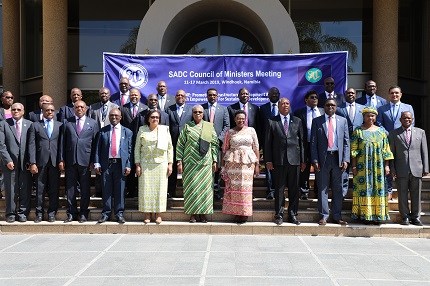
SADC ministers task Secretariat to review regional industrialisation roadmap

By Joseph Ngwawi, attending the Southern African Development Community (SADC) Council of Ministers meeting in Windhoek.
The SADC Council of Ministers meeting in Windhoek emphasised the importance to start implementing concrete strategies for industrial development stating that a review of the regional development blueprint is a top SADC priority.
The SADC Council chair, Hon Netumbo Nandi-Ndaitwah who is also the Namibian Deputy Prime Minister and the Minister of International Relations and Cooperation, said industrialisation remains a key priority. She urged her co-ministers “to establish mechanisms through which industrial development is realised.”
The region has over the past four years pursued various activities to roll out the SADC Industrialisation Strategy and Roadmap 2015-2063, which provides a framework for major economic and technological transformations at national and regional level in the context of deepening regional integration.
These activities include the development of value chains linked to the three priority sectors of agro-processing, mineral beneficiation and pharmaceuticals.
The region is also in the process of developing a Protocol on Industry, which is expected to be ready by the end of 2020.
Once completed, the protocol will provide the legal mandate for the SADC Secretariat to coordinate the implementation of regional industrial activities, programmes and projects, including the SADC Industrialization Strategy and Roadmap and its related Cost Action Plan.
In addition to pursuing the objective of rapid industrial growth, the region will be seized with the process of reviewing the Revised Regional Indicative Development Strategic Plan (RISDP) 2015-2020.
“The review of our flagship strategy, the Regional Indicative Strategic Development Plan (RISDP) is one of the ways through which the region would promote new and better ways of accomplishing our goals and objectives,” said Nandi-Ndaitwah.
As part of that process, SADC has so far convened a number of consultative meetings.
One of these was a Consultative Conference on the Post-2020 SADC Development Cooperation and Integration Strategy that was held in Johannesburg in 2017 with the purpose to obtain expert assessments and analysis of the implementation of the Revised RISDP as well as the Revised Strategic Indicative Plan of the Organ on Politics, Defence and Security Cooperation (SIPO), the blueprint governing SADC cooperation in the political sector.
Another consultative meeting was the SADC Strategic Ministerial Retreat on the “The SADC We Want” held in Ezulwini, Eswatini in March 2017.
The retreat agreed on measures to strengthen implementation of the integration agenda and promoting inclusive participation by citizens in regional programmes.
The ministerial retreat directed the SADC Secretariat to develop effective compliance, monitoring and assurance mechanisms to track progress in implementation of SADC programmes as well as compliance to protocols and legal instruments.
Since the transformation of SADC in 1992 from the Southern Africa Development Coordination Conference, a total of 33 protocols have been signed by member states to push forward the regional integration agenda.
However, only 26 protocols have been ratified and entered into force to date.
The Ezulwini retreat further called on the SADC Secretariat to prioritise programmes by focusing on infrastructure development, industrialisation and market integration, with peace and security as a prerequisite for economic development.
In addition, the SADC Secretariat was tasked to develop an effective engagement mechanism to strengthen participation of the private sector at all levels. It was noted that the lack of direct involvement of the private sector is a barrier to economic development.
The ongoing review is expected to lead to the development of a framework for a post-2020 regional strategy that takes into account SADC values and principles such as the need for sovereign equality and mutual benefit as well as continental and global processes such as the African Union’s Agenda 2063 and the United Nations’ Sustainable Development Goals respectively.
In addition, the review process is informed by the fact that there is need to maximise synergies in the implementation of the two pillars of SADC activities – political and security cooperation as identified under SIPO, and developmental integration as covered by the RISDP.
SIPO is a five-year strategic document that establishes SADC`s institutional framework for policy coordination and implementation in politics, defence and security cooperation, and was first developed in 2003.
The core objective of SIPO is to create a peaceful and stable political and security environment through which the region will realise its objectives of socio-economic development, poverty eradication, and regional integration.
The RISDP was first approved by SADC leaders in 2003 as a blueprint for regional socio-economic integration and development.
It was revised in 2015 to realign the development agenda with new realities and emerging global dynamics, and identified four main priorities to be pursued from 2015 to 2020.
Southern African News Features SANF 19 no 6, March 2019.Southern African News Features are produced by the Southern African Research and Documentation Centre (SARDC). Website and Virtual Library for Southern Africa at www.sardc.net












































